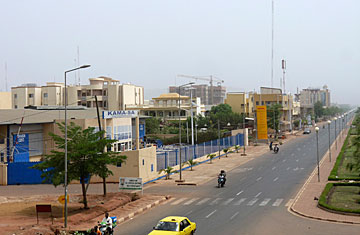
A main street is mostly deserted in Bamako, Mali on March 24, 2012, after the Malian army staged a coup d'etat in the country's capital.
Pick-ups packed with soldiers zoomed toward the maize-colored building that houses the State broadcaster as rumors flew of more civil strife in Mali. There was a counter-coup. No, there wasn't a counter-coup. The leader of the mutiny was dead. No, Capt. Amadou Sanogo would appear in a broadcast momentarily.
As soldiers looted petrol stations, hijacked cars and went joyriding, I had my own run-in with trouble. A rangy-looking man with knotted stubble snatched a tattered banknote from my hand as I bought a soda. "There are no police," the thief snarled, angrily, as we came close to blows. "You, I'm going to kill you," he shouted. It was one of countless incidents underscoring the security vacuum in Mali, until three days ago one of Africa's best functioning democracies.
Some of that anxiety receded over the course of Saturday, with shops re-opening for business, and a semblance of normality in Bamako's grand marche, where hairdressers' were packed, shopkeepers traded good-natured insults with each other and TIME saw one fashion-conscious diva batting her false eyelashes in the air as a beautician applied henna to her hands.
But this is a phony peace. The whereabouts of deposed President Amadou Toumani Touré are still not known (though he is rumored to be holed up in a barracks on the outskirts of Bamako). Leading politicians in Mali have come out against the coup in which junior officers seized power late Wednesday night — only for one of them to be arrested, resulting in several others going underground, fearful for their safety.
The leader of the junta, Capt. Sanogo, has ordered troops to respect the law, though, ironically enough, he has suspended the Malian constitution. Meanwhile, "The actions of the soldiers in the street are actually losing the mutineers support," one Western diplomat tells TIME. The sobering analysis from another diplomatic source is that things will likely get worse.
What this means for America's ability to combat terrorism in the Sahel is unclear, but training missions made up of National Guard and Army Special Forces have been temporarily suspended. "We are unable to proceed with assistance programs — military, humanitarian or otherwise — because of the insecure environment," a US Embassy spokesperson told TIME. Both the U.S. and the al-Qaeda terrorists operating in Mali's northern desert will be watching and waiting as the drama in Bamako plays out.
If there are any immediate beneficiaries, they would appear to be ethnic Tuareg rebels who are trying to exploit the division between Touré and the military in Bamako by advancing on Kidal, one of the biggest towns in northern Mali and a natural target given its largely Tuareg population. At 4:45 p.m. on Saturday an inhabitant of the desert town told TIME by phone that: "The rebels are coming into Kidal right now, the shooting started 20 minutes ago. People are panicking. Everyone's locked themselves inside." The battle can be expected to be grim: a fearsome pro-government militia commanded by El Hadj Gamou, a Tuareg with a seemingly "visceral disdain" for the rebel tribesmen, according to writer Andy Morgan, is holding the fort.
Two separate rebel groups issued statements that they were marching on Kidal: a rogue outfit called Ansar Eddine, which wants to establish Shar'ia law across Mali and which has been deemed a "jihadist movement" by the United Nations; and the Mouvement National pour la Libération de l'Azawad (MNLA), an explicitly secular liberation group. The MNLA says it wants independence for northern Mali after years of neglect by the central government, and few would disagree that Bamako has long marginalized the region. Successive Malian governments made little investment in health, education or development in Tuareg areas despite years of promises. "Mali claims to have invested 2.5 billion euros in the north these last 20 years," says Adam Thiam, a prominent Malian journalist. "Not only MNLA but even loyalist citizens would question that — they say either it's not true or the money has been diverted. They see no impact of that investment."
Yet the MNLA rebellion, which has drawn inspiration from successful independence campaigns in Eritrea and Sudan, faces two big obstacles. It has the support of neither the international community nor the northerners it claims to be fighting for. "It's been a disaster, a disaster," Abou Bakri Ag Mohammad, a Tuareg hotel owner from the fabled city of Timbuktu, tells TIME. "How many people are in refugee camps in Algeria and Mauritania?" he asks, referring to the estimated 200,000 people displaced by the fighting. "The rebellion is not our solution. The MNLA is talking about independence. We don't need it... I don't think the rebels fight for the people, they're fighting for their own personal interest. And the victim is the population." Ag Mohammad is not alone with that opinion. Yet if the leaders of the junta succeed in their desire to escalate the war with the Tuareg, the violence will only get worse.
